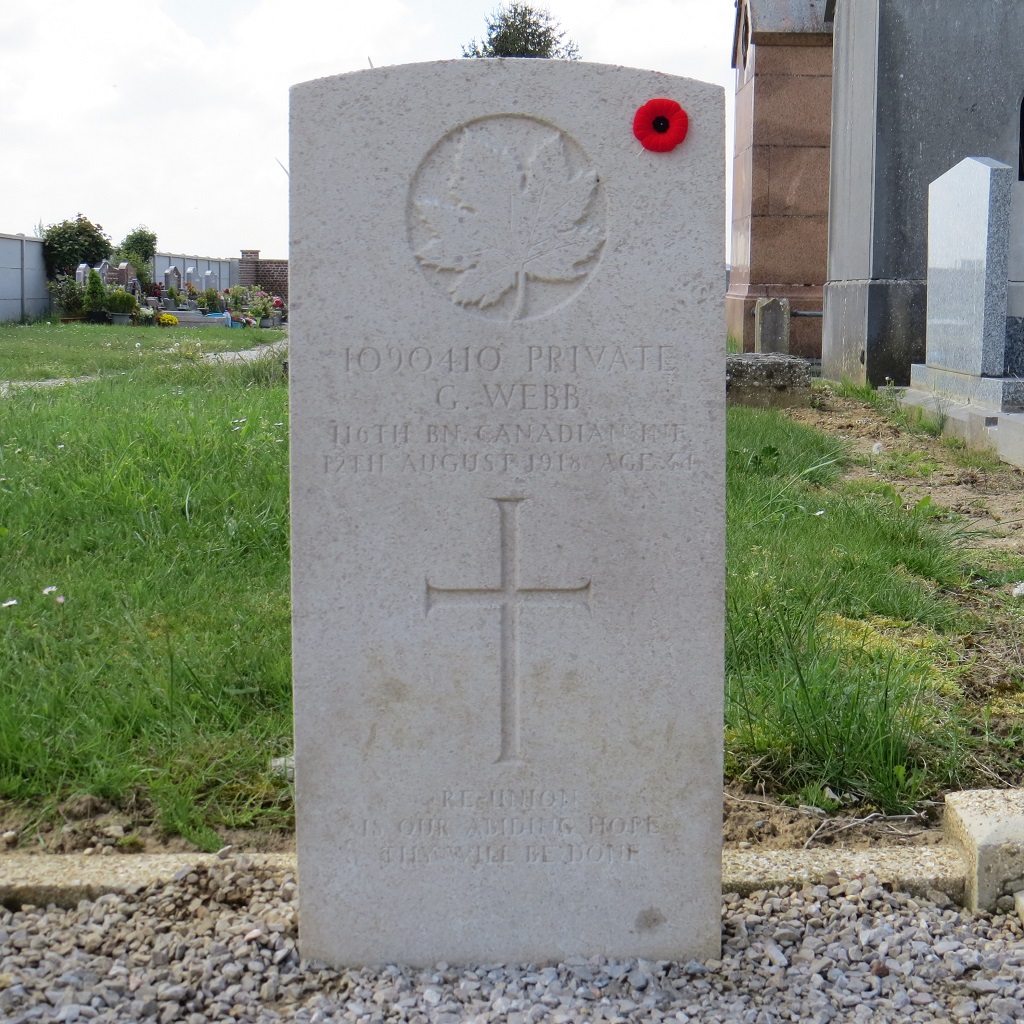RE-UNION
IS OUR ABIDING HOPE
THY WILL BE DONE
Private George Webb spent six months on the Western Front with the 116th Battalion in the Great War.

George Webb born 19 December 1883 in Tottenham, Middlesex, England.
Attestation
Private George Webb 1090410 enlisted with the 253rd Overseas Queen’s University Highland Battalion, Cobolt, Ontario on 12 March 1917. At this time, 33 years, 3 months of age, standing 5’7″ tall, 150 pounds, with fair complexion, grey eyes, and fair hair. Next-of-kin, his mother, Mrs Louisa Slark, 8 Luton Place, Greenwich, London, England, in addition a brother Ralph Webb of Cobalt, Ontario. George a plumber by trade.

253rd Battalion
Organized in October 1916 under the command of Lieutenant-Colonel Percy Gerald Cadogan Campbell. Mobilized at Kingston, and recruited in Kingston, Cornwall and Cobalt, and later embarked from Halifax 29 April 1917 aboard OLYMPIC. Disembarked England 7 May 1917 with a strength of 17 officers, 461 other ranks, and later absorbed by 5th Canadian Reserve Battalion.
George completes his will later on 13 April 1917, bequeathing all to his brother, Ralph Webb, now living at c/o J Riley, 72 Linden Avenue, Arlington, New Jersey.
Private George Webb overseas, 29 April 1917, per SS OLYMPIC from Halifax, and later transferred to 5th Canadian Reserve Battalion, 6 May 1917, West Sandling.

5th Canadian Reserve Battalion
5th Canadian Reserve Battalion (Central Ontario) organized at Bramshott on 5 January 1917 under the command Lieutenant-Colonel George Thomson Chisholm. Formed by absorbing 92nd, 95th and 169th Battalions, and later absorbed 157th Battalion on 10 February 1917, 241st Battalion on 7th May 1917 and 253rd Battalion in May 1917, and reinforced 15th, 20th and 134th Battalions. Moved to West Sandling before April 1917., and later absorbed by 12th Canadian Reserve Battalion on February 1918.
George transferred to 164th Battalion, Witley, 6 June 1917.
164th Battalion
Organized in December 1915 under the command of Lieutenant-Colonel Percy Domville. Mobilized at Orangeville, recruited in Halton and Dufferin counties, and later embarked from Halifax 11 April 1917 aboard CARPATHIA. Disembarked England later on 22 April 1917 with a strength of 26 officers, 710 other ranks. Drafts of 100 to 102nd Battalion and 100 to 116th Battalion in February 1918, and a draft of 100 to 21st Battalion later in March 1918. Finally, absorbed by 8th Canadian Reserve Battalion on 16 April 1918.
Private George Webb transferred to 116th Battalion, Witley, 28 February 1918.

116th Battalion
The 116th Battalion organized in November 1915 under the command of Lieutenant-Colonel Samuel Simpson Sharpe. Mobilized at Uxbridge, recruited in Ontario County, and later embarked from Halifax 24 July 1916 aboard OLYMPIC. Disembarked England 31 July 1916 with a strength of 36 officers, 948 other ranks. Arrived in France 11 February 1917 with the. 3rd Canadian Division, 9th Canadian Infantry Brigade, and later reinforced by 2nd Canadian Reserve Battalion. Returned to England 13 February 1919.

Arrived in Canada 24 March 1919. Demobilized 28 March 1919. Colours presented by The Junior Relief Club of Uxbridge on 20 May 1916, and later deposited in Westminster Abbey on 7 October for the duration of the war. Placed in church in Cannington, Ontario after the war, transferred to the Court House, Whitby where they were to remain until the postwar reorganization of the 34th Ontario Regiment. Perpetuated by The Ontario Regiment.
George arrived at his unit, 6 March 1918, and later awarded one Good Conduct Badge on 16 March 1918.
Battle of Amiens
On 11 August 1918, the 116th Battalion took over the line from remnants of the Royal Scots, Dorsets and Manchesters, who had run into stiff opposition in the neighborhood of Parvillers, and in consequence later suffered very heavy casualties.
The situation was what is called obscure, and on the following day, 12 August 1918, six platoons, in conjunction with the P.P.C.L.I. on the left, rushed forward to capture Middle Wood and Square Wood, with a number of machine guns falling into our hands, and identification secured.

Fifteen identified casualties of the 116th Battalion from 12 August 1918 with eight of those men appearing on the Vimy Memorial. George among those buried, though the only man of his unit left buried at Damery Communal Cemetery.

The remainder of his comrades from this day later exhumed and brought into Bouchoir New British Cemetery. As the War Graves Office had been in contact earlier with George’s grieving mother, likely she had opted for her son to remain in the communal cemetery, as was her right.

Damery Communal Cemetery
Damery a small village situated approximately 4 kilometres north-west of Roye. Firstly, from Roye take the D934, Roye to Amiens road. Then, turn right after approximately 2 kilometres towards the village of Damery – Damery Communal Cemetery at the entrance of the village.
The village and commune of Damery later captured by the 3rd Canadian Division on 15 August 1918 – the communal cemetery contains 11 Commonwealth burials of the Great War, four of which are unidentified.

Next-of-kin notified of George’s burial location on 30 March 1920.

